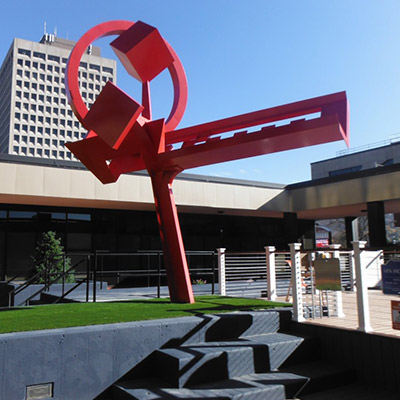Reviewed by David L. Schriber
About 800 persons were treated to a variety of Chinese performing arts Saturday (Nov. 6) at Binghamton University’s Anderson Center. Faculty from BU and from the National Academy of Chinese Theater Arts, plus the Melody of Dragon Chinese instrumental ensemble from New York City and the Amber Dance Troupe from Cornell University, presented a variety of Chinese music, dance and folk opera.
The concert celebrated the first anniversary of the Confucius Institute of Chinese Opera at BU (CICOBU), a joint initiative between the university and the National Academy of Chinese Theater Arts (NACTA). Confucius Institutes of the People’s Republic of China have as their mission the promotion of Chinese language and culture. There are more than 300 Confucius Institutes around the world; of the 64 in the United States, Binghamton University is the ONLY one to include xiqu or Chinese opera.
Beijing opera is not at all like classical Italian opera. It is folk opera, based on charming tales of life in ancient China. Supertitles projected in Chinese and English translated the lyrics, but much of the meaning was evident in the actions. Particularly amusing was “Autumn River,” a piece also performed at CICOBU’s inauguration last year. It’s a story about a woman who hires an old fisherman and his boat to take her down-river to follow her lover. With just a paddle for a prop, the two actors paint the scene with their actions, bobbing up and down in opposite ends of the invisible boat, slowly turning in circles as the boat negotiates the river, comically speeding up when traversing rapids.
Melody of Dragon’s musical instruments look fairly familiar for the most part, though their sound is quite different from that of their Western counterparts. The yangqin is a 144-string hammered dulcimer played with bamboo or rubber-covered bamboo mallets. The zhongruan is a four-string instrument sometimes called a “moon guitar” because of its round sound box. The dizi is a bamboo flute, held like a Western flute but more resembling a recorder by its construction of wood with finger holes rather than valves. A unique feature of the dizi is a paper-thin bamboo membrane, the dimo, which imparts a bright nasal quality to the sound. The erhu is a two-string Chinese fiddle. Unlike the Western violin, the erhu’s sound comes not from an open resonating chamber but from a python skin membrane stretched over the sound box like a drumhead. The bow is not separate from the instrument; it does not pass over the strings but between them. There are no frets or fingerboard, the strings being stopped by touching them without pressing them into the neck. Dizi virtuoso Chen Tao mesmerized the audience with his fingering of “Birds amid Tree Shadows,” imitating the singing and chirping of many different birds. Not flustered when the dimo membrane failed on his instrument, Chen made a quick field repair and returned moments later, quipping that the instrument would now have a slightly different sound, like “older birds.” He finished his program to great applause.
The Amber Dance Troupe performed several routines, some with airy chiffon costumes, others having an almost cowboy look and sound. The group lacked some synchrony in their parallel movements and did not appear to have the same balance control as NACTA professor Jiao Jingge in his vignette “Descending the Mountain.”
Mezzo-soprano Hong Zhang performed three songs with a classical Western sound, accompanied by pianist Pej Reitz. I wish the lyrics had been translated and projected as supertitles.
A couple criticisms of the staging: The 18 offerings made for a long concert, over 2.5 hours. It could have been shortened a little with swifter stage changes and tighter introductions. Some of the sound levels, particularly on actress and singer Liu Kuiran and erhu virtuoso Jiang Xin, were almost ear-splitting. And one might have wished for the house lights to have been left up dimly so one could follow the descriptions in the concert program.
Binghamton is very fortunate to be the center for Beijing Opera in the United States. Visiting Chinese professors and artists at Binghamton University will do much to enhance the cultural diversity of our already rich arts community. We look forward to seeing more examples of Chinese folk opera in future performances.




































